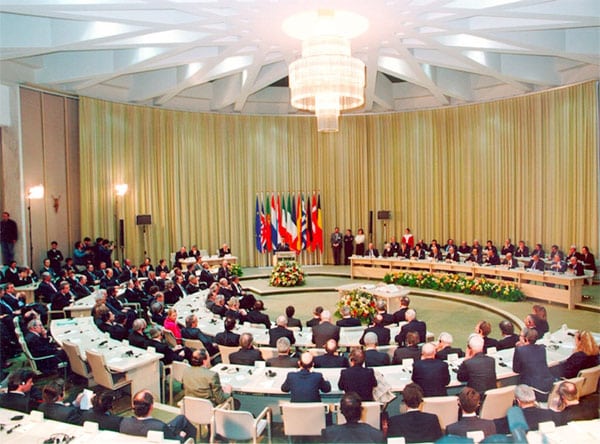
The Maastricht Treaty (1992) enshrined a formula that was to be repeated in all subsequent basic EU documents: to move towards ‘an ever closer union among the peoples of Europe’. David Cameron wants the principle to be removed the next time the treaties are reformed and, in a reverse move, he wants a looser union and powers to be repatriated from Brussels. He is not alone in wanting that. For instance, Poland’s recently-elected President Andrzej Duda, in a Eurosceptic turnaround, has now adopted a similar stance and wants ‘less Europe’. Cameron and Duda are separated, however, by the desire of the former and the rejection of the latter to limit the free movement of workers within the EU, something that is directly contrary to that fundamental aim.
Perhaps we should stop speaking vacuously on every conceivable occasion of the pious desire for ‘more Europe’ when precisely what a growing section of Europe’s citizenry –the singular here is also appropriate– demand is ‘another Europe’, more united in certain things but less in others, and in any case different to the present one. The EU does not need to be continually adding competences. Perhaps Cameron’s will serve for some things (a few) that no longer need to be decided in Brussels to be returned to nations or regions, while others in the national realm can pass on to Europe. And any country not in agreement can then opt out, as at present. In fact, EU legislation has been increasingly focusing on directives (to be transposed into national law) and not on directly applicable regulations. Therefore, a certain renationalisation of Europe can co-exist with significant progress in other spheres.
Given Cameron’s stance, it is no surprise that countries like Germany and France –particularly the latter, which rejected the European Constitution in a referendum in 2005– are against any important short-term changes in the treaties, because that would open up the need for further polls of a very uncertain outcome, and eliminating the formula Cameron loathes and carrying out other downsizing revisions in a Europe that would become pretty directionless. Angela Merkel, nevertheless, is open to some possible revisions but in a very imprecise way and without a specific schedule. But there does not seem to be enough time for such a purpose from now until the end of 2017, the latest date pledged by Cameron for an in or out referendum.
Berlin and Paris have tabled a joint proposal to deepen the Economic and Monetary Union on four important issues without changing, at least in the short term, the treaties: (1) economic policy; (2) economic, tax and social convergence; (3) financial stability and investment; and (4) reinforcement of the Eurozone’s governance and institutional framework.
Spain, in turn, has presented a constructive document that calls for a change in the mandate of the European Central Bank (ECB) as regards monetary policy to take into account not only inflation and its differences but also those relating to labour costs and trade imbalances, to promote convergence and prevent asymmetric shocks such as experienced recently. Furthermore, it calls for a fiscal union, with its own budget and instruments of debt mutualisation, and the creation of a system to facilitate cross-border banking mergers. Hence, the Spanish government wants to go further, in fact, much further, although the times may not seem the most propitious.
The Franco-German message is clear: to go further, at least as regards the Eurozone and in their own way, and without changing the treaties before the UK holds its Brexit referendum. Nevertheless, contrary to what Spain wants, this Europe is being built in a rather odd and un-European way. To quote two examples: instead of a fiscal union, there is to be a union of fiscal discipline; and the European resolution mechanism for bank failures will be the responsibility of the Member States, with the EU only accounting for 20%. It is true that there is now a system of banking supervision at the ECB and its president is fully applying quantitative easing (QE) from his institution. But Juncker’s Strategic Investment Plan is based primarily on private contributions, albeit with a European guarantee. This is all far removed from the idea of a federal Europe.
It is not that Cameron is all out on an aggressive campaign against the EU, but he does want to convince his partners –so as to convince his fellow countrymen– that a downsized Union will benefit everyone. He is, at the moment, on a charm offensive. And many of his colleagues in the European Council want to help him win the referendum, but not at the cost of fundamentally changing the EU and preventing progress in the Eurozone, of which the UK is not part.
In turn, from the European Commission Juncker himself is attempting to charm the British with three proposals for progress that are of interest to them and everyone else (especially Spain): the energy union, capital markets and digital unions. With these three unions, as noted by Federico Steinberg, ‘the EU intends to take practical measures to increase growth and employment and help restore public confidence in its institutions’. And, one might add, lead to new steps towards that ‘ever closer union’. Although it will no longer involve all the peoples of Europe.


